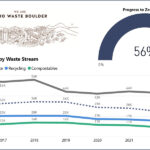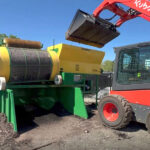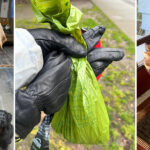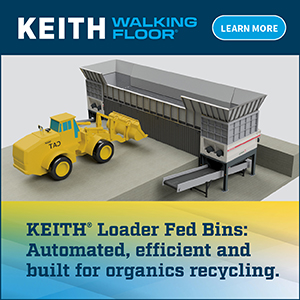BioCycle September 2014
Baltimore, Maryland: Community Composting At Urban Farm
Real Food Farm is Civic Works’ 8-acre innovative urban agricultural enterprise dedicated to growing and distributing fresh produce in and around Clifton Park in Northeast Baltimore. Civic Works is a nonprofit organization dedicated to strengthening Baltimore’s communities through education, skills development and community service. Real Food Farm, which began in 2009, has the mission of working towards a just and sustainable food system, and strives to improve access to healthy food in surrounding communities, provide experiential education for Baltimore area youth, promote urban agriculture in Baltimore City, and demonstrate environmentally-friendly farming practices. The farm also supports a community composting program by accepting food scraps and yard trimmings from residents. It also partners with Compost Cab as a drop-off for the food scraps picked up through the collection service’s Baltimore program. On occasion, the farm even receives loads of brewers mash from local breweries. Separate drop-off areas are designated for dry and wet material, with signage to help direct where food scraps should go.. All materials are then mixed and put into an active windrow on the farm. Finished compost is used on the farm, mostly in the potting mix for seed starting.
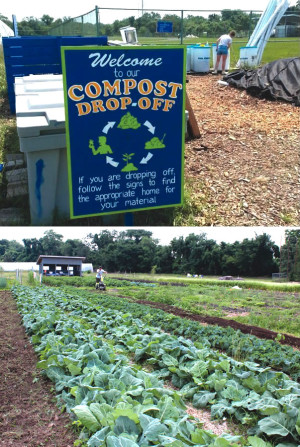
Real Food Farm, in Baltimore, supports a community composting program by accepting food scraps and yard trimmings from residents.
Education is another important component of Real Food Farm. The farm works with teachers to develop lessons, hosts after school programming for middle school students, a year-round high school internship, and coordinates a 6-week intensive summer employment program for high school students to learn about agriculture, nutrition, and related topics. Some of the high school internship graduates have then gone on to serve as AmeriCorps members on the farm, and many of the farm’s AmeriCorps graduates have gone on to start their own farms. Real Food Farm also hosts a variety of year-round training opportunities for the aspiring adult urban grower, including a day of workshops in early spring and lecture series during late winter.
Philadelphia, Pennsylvania: City Sprouts’ Sustainable Services
After an exceptionally challenging winter, Philly Compost, a small-scale commercial food waste collection company, decided to cease hauling operations in spring of 2014. Jennifer Mastalerz, an employee of Philly Compost, opted to continue the bike collection and community composting portion of Philly Compost on her own. “Between a few other companies, we found replacement haulers for almost all of our customers we serviced with our truck,” says Mastalerz. “I personally decided to use the opportunity to try out entrepreneurship and launched City Sprouts in May. I am just focusing on the community scale composting of the original Compost Coop.” With equipment and support provided by Philly Compost, Mastalerz had begun The Compost Coop in the Fishtown neighborhood in Philadelphia in mid-2011 to create an opportunity for Fishtown residents to divert household food scraps by becoming a Compost Coop member. Members are given the combination to the lock on the gate in order to drop off food scraps in designated bins. The corner property, at one time a garden center, is owned by the New Kensington Community Development Corporation (NKCDC). About 2,000 square feet of the property is used for the community composting operation.
While with Philly Compost, Masterlaz oversaw the composting operation — which includes two Earth Tubs and wire bins for curing — and also ran the bike collection service to pick up food scraps from neighborhood businesses and households. “Now, as City Sprouts, I’m up to 13 commercial customers on the bike collection route, have a strong and growing residential volunteer program with about 70 members and had a really great year in terms of compost sales,” says Masterlaz of her first few months in business on her own. “I have someone helping out with the bike collections. With the food scraps dropoff program for residents, we have two levels of membership available — working ($25/year) and nonworking ($50/year). Working members commit to a small amount of volunteering per year to help with tasks associated with organics processing. All members receive free compost, as do our commercial customers. I sell both bulk and bagged product but mostly bagged because it’s more convenient. We sell a lot of compost to schools that have money available to install gardens and need a soil amendment for their raised beds. Being able to deliver the compost to them is a big selling point. Unfortunately I’m not doing this part via bicycle yet! I use a pickup truck or my Honda Fit depending on order size.”
Windham County, Vermont: Implementing Diversion Programs At Schools
This summer, the Windham Solid Waste Management District (WSWMD) received a grant from the Vermont Agency of Natural Resources to establish organics recycling programs at the high schools (and one middle school) in Windham County, which encompasses the towns of Brattleboro, Townshend, and Whitingham. “The majority of the $11,250 in grant funds will be spent on implementation, which includes providing collection containers and paying for hauling costs,” explains Bob Spencer, Executive Director of the WSWMD. “In addition, a Committee will be established at each school to oversee the organics recycling program and its implementation; Provide education materials and carry out source separation trainings; and Set up the container system where food scraps will be collected. It’s a very hands-on implementation.” Also included in the grant are funds for establishing environmental clubs at each school, with the intention of these groups taking on the responsibility of making the programs sustainable.
Organics recycling programs at schools in Windham County are not a novelty, but until now have been limited to mainly elementary schools. “Although a number of public and private schools in Windham County already had on-site food scrap composting, or collection of organics for delivery to farms or composting facilities, none of the four regional high schools have such programs,” notes Spencer. He adds that the younger students’ experience with food scraps recycling should help in implementing the programs at the high schools. “We already have generations that will be used to doing this,” he says.
Training more of the county’s population in source separation behavior will assist in compliance with the state’s Act 148 Universal Recycling Law that requires all sectors, including residential, to divert recyclables and organics from disposal by 2020. “Through these grant funds, we will be able to bring the behavior of organics diversion to a huge population via the county’s students,” notes Spencer. “This grant will launch organics collection programs for the high schools, and hopefully that will spur more businesses and residents to follow suit.” Spencer explains that potentially 19,000 Windham County residents will be impacted as a result of the high school organics recycling programs, and that WSWMD has made it a commitment to encourage that behavior doesn’t stop when students leave school grounds.
Sacramento, California: Compost Coalition’s Legislative Updates
The September 2014 edition of the California Compost Coalition’s (CCC) newsletter provides updates on several key pieces of legislation of importance to the state’s composting industry. The newsletter also provided updates on several agency rulemakings, as well as the status of CalRecycle’s composting grants. The CCC (www.californiacompostcoalition.org) a lobbying coalition created in 2002, represents member organic material recyclers and compost operators, and is managed by Edgar & Associates, a Sacramento-based solid waste and organics recycling consulting firm. The following updates are excerpted from the CCC newsletter:
Assembly Bill (AB) 1594 (Williams): Would eliminate the solid waste diversion credit for green waste used as Alternative Daily Cover (ADC) at a solid waste landfill. CalRecycle regulations (Title 14) contain an approved list of ADC materials, which includes processed green material. Jurisdictions currently receive landfill diversion credit for use of green materials as ADC, which is a major barrier to composting facility development, due to ADC’s low cost and reduction of available feedstock supply. AB 1594 passed off of the Senate and Assembly Floors at the end of session with minor amendments and has been enrolled to the Governor. Remaining local government amendments, exempting ADC green materials from the mandatory $1.40 disposal fee surcharge, remained after they were added in Assembly Appropriations. CalRecycle policymakers have signaled that they may ask for a Governor’s veto, as the disposal fee exemption creates bad precedent and policy at a time when they are looking to revamp the current Integrated Waste Management Account fee structure.
AB 1826 (Chesbro): Would establish a mandatory commercial organic waste diversion program, requiring businesses that generate a specified quantity of organic waste to arrange for recycling services. CCC has maintained a “Support, if amended” position in an effort to reduce current bill language thresholds [quantity generated to fall under mandate] for program enrollment — currently 8 cubic yards (cy)/week of organic waste in 2016, and 4 cy/week in 2017, with a final goal of 1 cy/week in 2019. AB 1826 is on the Governor’s desk awaiting his signature. On August 11, the bill moved off the Senate Floor and returned to the Assembly, where Senate amendments were concurred with and the bill was enrolled to the Governor on August 14.
Revision to Compostable Materials & Transfer/Processing Regulations: CalRecycle (the state solid waste agency) is updating regulations to address a broad list of topics, mainly related to the expanding diversion of organic materials from landfills. These include addition of new language regarding anaerobic digestion, and feedstock definitions, odors, permitting tiers, etc. at composting facilities. Allowable contamination in compost and mulch products remains the largest remaining unresolved issue. Status: Final draft regulations were published in October 2013. Economic analysis is underway. Final informal meeting prior to formal rulemaking scheduled for September 25.
Waste Discharge Requirements: Formal rulemaking has begun by the State Water Resources Control Board (SWRCB) to implement statewide Waste Discharge Requirements (WDRs) for composting facilities. SWRCB intends to adopt a general order that would assist their regional boards in the regulation of composting facilities, which they have deemed a substantial threat to water quality. Status: Final draft regulations were published in August 2013. Economic analysis has been completed. The EIR (Environmental Impact Review) process is underway, with release of a DEIR and General Order expected in Fall 2014.
CalRecycle Compost Grants Update: Grant applications submitted on July 1, 2014 are still being evaluated and scored by a CalRecycle review panel, based on the approved Organics Grant Program Scoring Criteria. Due to the extensive and thorough review needed for each of the 51 applications totaling $118 million in requests, CalRecycle anticipates announcing the $15 million of awards in October 2014 instead of September 2014, as the program is oversubscribed in the first year. With the transportation sector being brought into “cap and trade” starting January 1, 2015, the amount of revenue for cap and trade could triple, amounting to more CalRecycle grant money in next year’s Governor’s budget which is due in early January 2015.



